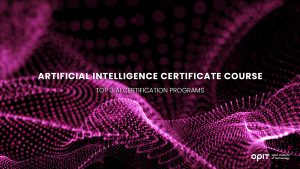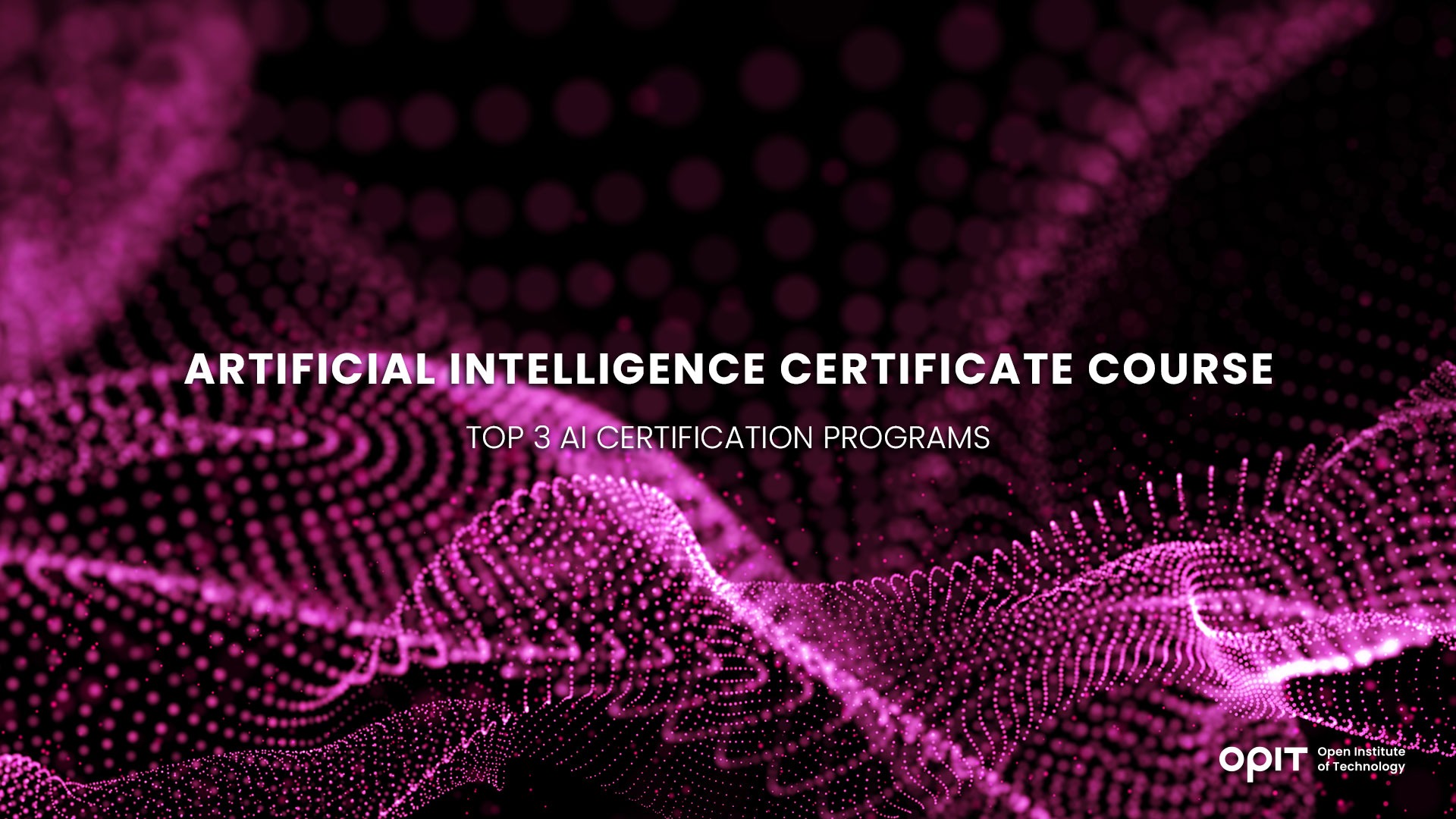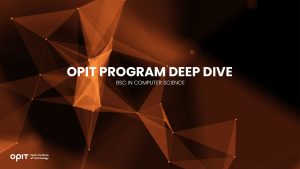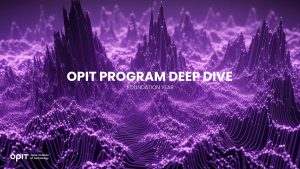

When artificial intelligence (AI) first emerged, it was perceived as nothing more than a gimmick, an exciting sci-fi idea with no practical applications. It took a few decades to dispel these misconceptions. Still, considering the importance of AI today, they’re definitely ancient history.
Since AI aims to simulate human intelligence processes like learning, reasoning, and creativity, it has found its way into numerous industries that rely on these skills to prosper. Healthcare, retail, security, and finance are just some industries that have experienced the benefits of AI firsthand.
As AI permeates more and more of everyone’s daily lives, the need for highly skilled AI professionals is only growing. And if you are to take on a new career, AI is the way to go. This lucrative field offers seemingly endless job opportunities and a unique chance to shape the world’s future.
If you’ve been eyeing the AI career path for a while, an AI certification course can help you get the hang out of the basics and enter this field with a bang. Even if you have experience with AI, there’s always something new to learn.
Whatever the case, you’ll learn something valuable from each AI certificate course on this best-of list.
Benefits of AI Certification Courses
An AI certification course is an excellent way to immerse yourself in this technology and earn a helpful certificate in the processes. And that’s only the beginning. Check out some of the most appealing benefits of completing one of these courses.
Enhancing Career Prospects
Considering the ever-growing power of AI, it isn’t surprising that your prospective employers are some of the biggest tech companies and market disruptors. Google, Amazon, Microsoft, and Apple are just some tech giants looking for employees well-versed in AI.
On top of that, getting certified in AI opens up a world of possibilities in terms of job prospects. Sure, you can be an AI engineer. But with these skills, you can also pursue a career as a data scientist, software engineer, machine learning engineer, and more.
Staying on Top of the Latest AI Trends
The AI field is constantly up to something new. Just when you think you’ve got it all figured out, a new AI craze appears and takes the world by storm. Taking the latest AI certificate course will allow you to stay on top of these trends and even stay ahead of them.
Gaining a Competitive Edge in the Job Market
The demand for AI doesn’t show any signs of slowing down. As people catch on, the field gets increasingly crowded by those seeking a sizeable paycheck. But being self-taught and getting certified in the field are worlds apart.
With an AI certification course under your belt, your career prospects will look much better. Potential employers will perceive you as a worthy candidate from the get-go. Throw some hands-on experience into the mix, and your competitive edge will be off the charts.
Improve Problem-Solving and Decision-Making Skills
AI is all about tackling complex cognitive processes, such as problem-solving and decision-making. So, through learning the AI methodology, you’ll also work on these skills. And the best part is that these skills can benefit you in solving real-life problems and in other fields far beyond AI.
Top AI Certification Courses
If you’re keen on taking an AI course, you’ll have many choices online. Just search the words “AI certificate course” and see for yourself. However, only some courses you encounter will help you achieve your goals. To help you avoid wasting time and money, here are the top three AI certification courses and all the necessary information about them.
1 – IBM Applied AI Professional Certificate
If you’re new to AI, this is the AI certificate course for you. This beginner-friendly program will ease you into the world of AI, teaching you all the terms you’ll need to navigate this field.
But don’t worry, that’s just the beginning. Afterward, you’ll dive into the practical portion of the course and learn how to build AI-powered tools, create virtual assistants, and apply computer vision techniques.
During this program, you’ll explore the following concepts and tools:
- Data science
- Machine learning
- Natural language processing
- Image classification and processing
- IBM Watson AI services
- OpenCV
- APIs
At a pace of 10 hours a week, you’ll need about three months to complete this AI certificate course. Plus, you’re free to adjust this schedule, as the course is entirely self-paced.
As for the fee, you can use Coursera’s free seven-day trial to start. Once those seven days are up, you’ll be charged $39 (a little over €36) monthly to continue studying.
Complete the program, and you’ll earn an employer-recognized certificate from IBM demonstrating your technical proficiency in AI.
2 – Artificial Intelligence A-Z
You might be interested in this AI certificate course if you already have some basic Python knowledge. You’ll start with fundamental AI concepts but quickly move on to hands-on experiences. Learning how to make a virtual self-driving car, creating an AI to beat games, and solving real-world problems with AI are just some practical skills you’ll learn here.
As the name implies, this course will take you from a beginner to an expert in specific AI skills. To achieve this, you’ll need to go through 17 hours of on-demand video lessons, 20 articles, and three additional resources.
For a $99.99 fee (a little over €93), you’ll gain lifetime access to this course’s contents and receive a shareable certificate.
3 – Artificial Intelligence Engineer (AIE) Certification
Learners wanting to earn official certification in the AI field should look no further than this AI certification course. This course’s tagline is “The Qualification that Matters,” and it’s entirely true. After all, this course and the ensuing certification exam are offered by the Artificial Intelligence Board of America (ARTiBA), the world’s leading AI certification body.
This AI certification course functions differently than other courses on our list. The main difference is that you take a certification test after completing the learning portion.
The curriculum for this course includes the following topics:
- Machine learning
- Regression
- Supervised and unsupervised learning
- Reinforced learning
- Neural networks
- Natural language processing
- Cognitive computing
- Deep learning
As you can see, this AI certification course leaves no stone unturned. But don’t let the complexity of the course scare you. Think of it as a path to acquiring highly sought-after skills and job-ready capabilities that will propel your career in AI forward.
The entire program costs $550 (close to €513). Once you pay the fee and register, you’ll have 180 days to master the learning materials and prepare for the AIE certification exam.
Factors to Consider When Choosing an AI Certification Course
Exploring more AI courses beyond these top picks may seem enticing. But before you make a final decision, consider these factors when choosing your next AI certificate course.
Course Content and Relevance
Before starting your search, take some time to assess your current career goals. What AI field interests you the most? What skills do you lack for your dream job? Think of these and similar questions and clearly define what you want to get out of the AI certificate course.
Once you do this, it’s only a matter of determining whether the course’s curriculum is relevant to your career path. Check the course’s description and see if it covers the topics you’re interested in. If it does, it passes the first elimination round.
Course Duration and Flexibility
The next factor is how well your chosen AI certificate course fits your lifestyle. If you’re a student, great; you probably have more wiggle room in your schedule. But you’ll have to find something more flexible if you’re already working and looking to switch fields or improve your AI skills.
The course’s description will also help you in this regard. Check how long the course lasts, whether it’s self-paced, and how much time you must devote to it weekly. Only start the course if you can fully commit to it.
Course Provider’s Reputation and Industry Recognition
As important as the course’s content is, ensuring it comes from a reputable organization is also crucial. Universities like MIT and Harvard are a great way to go. Of course, you should also consider recognized names in the AI industry (Google, IBM, Microsoft, etc.)
Sure, an AI certification course from these institutions looks better on your resume. But you can also rest assured that the content you’ll learn is high-quality, accurate, and up-to-date.
Cost and Return on Investment
You can find plenty of free AI courses on the internet. But if you want the best of the best (and receive a certificate at the end), be prepared to pay a course fee. Take one look at these fees online, and you’ll see prices ranging from €30 to thousands of euros.
But be careful, as the more expensive courses aren’t necessarily better. What makes a high price tag worth it is a whole set of course features. So before paying any fee, research whether the knowledge, support, and certificate you’ll receive will secure many job opportunities in the future.
Master AI and Transform Your Future
With a high-quality AI certification course under your belt, there’s no stopping you in the computer science field. Choose your courses wisely, and you’ll always stay ahead of the competition in the job market.
Related posts

Computer Science is fast becoming one of the most valuable fields of study, with high levels of demand and high-salaried career opportunities for successful graduates. If you’re looking for a flexible and rewarding way to hone your computing skills as part of a supportive global community, the BSc in Computer Science at the Open Institute of Technology (OPIT) could be the perfect next step.
Introducing the OPIT BSc in Computer Science
The OPIT BSc in Computer Science is a bachelor’s degree program that provides students with a comprehensive level of both theoretical and practical knowledge of all core areas of computer science. That includes the likes of programming, databases, cloud computing, software development, and artificial intelligence.
Like other programs at OPIT, the Computer Science BSc is delivered exclusively online, with a mixture of recorded and live content for students to engage with. Participants will enjoy the instruction of world-leading lecturers and professors from various fields, including software engineers at major tech brands and esteemed researchers, and will have many paths open to them upon graduation.
Graduates may, for example, seek to push on with their educational journeys, progressing on to a specialized master’s degree at OPIT, like the MSc in Digital Business and Innovation or the MSc in Responsible Artificial Intelligence. Or they could enter the working world in roles like software engineer, data scientist, web developer, app developer, or cybersecurity consultant.
The bullets below outline the key characteristics of this particular course:
- Duration: Three years in total, spread across six terms.
- Content: Core courses for the first four terms, a student-selected specialization for the fifth term, and a capstone project in the final term.
- Focus: Developing detailed theoretical knowledge and practical skills across all core areas of modern computer science.
- Format: Entirely online, with a mixture of live lessons and asynchronous content you can access 24/7 to learn at your own pace.
- Assessment: Progressive assessments over the course of the program, along with a capstone project and dissertation, but no final exams.
What You’ll Learn
Students enrolled in the BSc in Computer Science course at OPIT will enjoy comprehensive instruction in the increasingly diverse sectors that fall under the umbrella of computer science today. That includes a close look at emerging technologies, like AI and machine learning, as well as introductions to the fundamental skills involved in designing and developing pieces of software.
The first four terms are the same for all students. These will include introductions to software engineering, computer security, and cloud computing infrastructure, as well as courses focusing on the core skills that computer scientists invariably need in their careers, like project management, quality assurance, and technical English.
For the fifth term, students will have a choice. They can select five electives from a pool of 27, or select one field to specialize in from a group of five. You may choose to specialize in all things cybersecurity, for example, and learn about emerging cyber threats. Or you could focus more on specific elements of computer science that appeal to your interests and passions, such as game development.
Who It’s For
The BSc in Computer Science program can suit a whole range of prospective applicants and should appeal to anyone with an interest or passion for computing and a desire to pursue a professional career in this field. Whether you’re seeking to enter the world of software development, user experience design, data science, or another related sector, this is the course to consider.
In addition, thanks to OPIT’s engaging, flexible, and exclusively online teaching and learning systems, this course can appeal to people from all over the globe, of different ages, and from different walks of life. It’s equally suitable for recent high school graduates with dreams of making their own apps to seasoned professionals looking to broaden their knowledge or transition to a different career.
The Value of the BSc in Computer Science Course at OPIT
Plenty of universities and higher education establishments around the world offer degrees in computer science, but OPIT’s program stands out for several distinctive reasons.
Firstly, as previously touched upon, all OPIT courses are delivered online. Students have a schedule of live lessons to attend, but can also access recorded content and digital learning resources as and when they choose. This offers an unparalleled level of freedom and flexibility compared to more conventional educational institutions, putting students in the driving seat and letting them learn at their own pace.
OPIT also aims not merely to impart knowledge through lectures and teaching, but to actually help students gain the practical skills they need to take the next logical steps in their education or career. In other words, studying at OPIT isn’t simply about memorizing facts and paragraphs of text; it’s about learning how to apply the knowledge you gain in real-world settings.
OPIT students also enjoy the unique benefits of a global community of like-minded students and world-leading professors. Here, distance is no barrier, and while students and teachers may come from completely different corners of the globe, all are made to feel welcome and heard. Students can reach out to their lecturers when they feel the need for guidance, answers, and advice.
Other benefits of studying with OPIT include:
- Networking opportunities and events, like career fairs, where you can meet and speak with representatives from some of the world’s biggest tech brands
- Consistent support systems from start to finish of your educational journey in the form of mentorships and more
- Helpful tools to expedite your education, like the OPIT AI Copilot, which provides personalized study support
Entry Requirements and Fees
To enroll in the OPIT BSc in Computer Science and take your next steps towards a thrilling and fulfilling career in this field, you’ll need to meet some simple criteria. Unlike other educational institutions, which can impose strict and seemingly unattainable requirements on their applicants, OPIT aims to make tech education more accessible. As a result, aspiring students will require:
- A higher secondary school leaving certificate at EQF Level 4, or equivalent
- B2-level English proficiency, or higher
Naturally, applicants should also have a passion for computer science and a willingness to study, learn, and make the most of the resources, community, and support systems provided by the institute.
In addition, if you happen to have relevant work experience or educational achievements, you may be able to use these to skip certain modules or even entire terms and obtain your degree sooner. OPIT offers a comprehensive credit transfer program, which you can learn more about during the application process.
Regarding fees, OPIT also stands out from the crowd compared to conventional educational institutions, offering affordable rates to make higher tech education more accessible. There are early bird discounts, scholarship opportunities, and even the option to pay either on a term-by-term basis or a one-off up-front fee.

The Open Institute of Technology (OPIT) provides a curated collection of courses for students at every stage of their learning journey, including those who are just starting. For aspiring tech leaders and those who don’t quite feel ready to dive directly into a bachelor’s degree, there’s the OPIT Foundation Program. It’s the perfect starting point to gain core skills, boost confidence, and build a solid base for success.
Introducing the OPIT Foundation Year Program
As the name implies, OPIT’s Foundation Program is about foundation-level knowledge and skills. It’s the only pre-bachelor program in the OPIT lineup, and successful students on this 60-ECTS credit course will obtain a Pre-Tertiary Certificate in Information Technology upon its completion. From there, they can move on to higher levels of learning, like a Bachelor’s in Digital Business or Modern Computer Science.
In other words, the Foundation Program provides a gentle welcome into the world of higher technological education, while also serving as a springboard to help students achieve their long-term goals. By mixing both guided learning and independent study, it also prepares students for the EQF Level 4 experiences and challenges they’ll face once they enroll in a bachelor’s program in IT or a related field.
Here’s a quick breakdown of what the OPIT Foundation Program course involves:
- Duration: Six months, split into two terms, with each term lasting 13 weeks
- Content: Three courses per term, with each one worth 10 ECTS credits, for a total of 60
- Focus: Core skills, like mathematics, English, and introductory-level computing
- Format: Video lectures, independent learning, live sessions, and digital resources (e-books, etc.)
- Assessment: Two to three assessments over the course of the program
What You’ll Learn
The OPIT Foundation Program doesn’t intensely focus on any one particular topic, nor does it thrust onto you the more advanced, complicated aspects of technological education you would find in a bachelor’s or master’s program. Instead, it largely keeps things simple, focusing on the basic building blocks of knowledge and core skills so that students feel comfortable taking the next steps in their studies.
It includes the following courses, spread out across two terms:
- Academic Skills
- Mathematics Literacy I
- Mathematics Literacy II
- Internet and Digital Technology
- Academic Reading, Writing, and Communication
- Introduction to Computer Hardware and Software
Encompassing foundational-level lessons in digital business, computer science, and computer literacy, the Foundation Program produces graduates with a commanding knowledge of common operating systems. Exploring reading and writing, it also helps students master the art of communicating their ideas and responses in clear, academic English.
Who It’s For
The Foundation Year program is for people who are eager to enter the world of technology and eventually pursue a bachelor’s or higher level of education in this field, but feel they need more preparation. It’s for the people who want to work on their core skills and knowledge before progressing to more advanced topics, so that they don’t feel lost or left behind later on.
It can appeal to anyone with a high school-level education and ambitions of pushing themselves further, and to anyone who wants to work in fields like computer science, digital business, and artificial intelligence (AI). You don’t need extensive experience or qualifications to get started (more on that below); just a passion for tech and the motivation to learn.
The Value of the Foundation Program
With technology playing an increasingly integral role in the world today, millions of students want to develop their tech knowledge and skills. The problem is that technology-oriented degree courses can sometimes feel a little too complex or even inaccessible, especially for those who may not have had the most conventional educational journeys in the past.
While so many colleges and universities around the world simply expect students to show up with the relevant skills and knowledge to dive right into degree programs, OPIT understands that some students need a helping hand. That’s where the Foundation Program comes in – it’s the kind of course you won’t find at a typical university, aimed at bridging the gap between high school and higher education.
By progressing through the Foundation Program, students gain not just knowledge, but confidence. The entire course is aimed at eliminating uncertainty and unease. It imbues students with the skills and understanding they need to push onward, to believe in themselves, and to get more value from wherever their education takes them next.
On its own, this course won’t necessarily provide the qualifications you need to move straight into the job market, but it’s a vital stepping stone towards a degree. It also provides numerous other advantages that are unique to the OPIT community:
- Online Learning: Enjoy the benefits of being able to learn at your own pace, from the comfort of home, without the costs and inconveniences associated with relocation, commuting, and so on.
- Strong Support System: OPIT professors regularly check in with students and are on hand around the clock to answer queries and provide guidance.
- Academic Leaders: The OPIT faculty is made up of some of the world’s sharpest minds, including tech company heads, experienced researchers, and even former education ministers.
Entry Requirements and Fees
Unlike OPIT’s other, more advanced courses, the Foundation Program is aimed at beginners, so it does not have particularly strict or complex entry requirements. It’s designed to be as accessible as possible, so that almost anyone can acquire the skills they need to pursue education and a career in technology. The main thing you’ll need is a desire to learn and improve your skills, but applicants should also possess:
- English proficiency at level B2 or higher
- A Secondary School Leaving Certificate, or equivalent
Regarding the fees, OPIT strives to lower the financial barrier of education that can be such a deterrent in conventional education around the world. The institute’s tuition fees are fairly and competitively priced, all-inclusive (without any hidden charges to worry about), and accessible for those working with different budgets.
Given that all resources and instruction are provided online, you can also save a lot of money on relocation and living costs when you study with OPIT. In addition, applicants have the option to pay either up front, with a 10% discount on the total, or on a per-term basis, allowing you to stretch the cost out over a longer period to ease the financial burden.
Have questions?
Visit our FAQ page or get in touch with us!
Write us at +39 335 576 0263
Get in touch at hello@opit.com
Talk to one of our Study Advisors
We are international
We can speak in:


